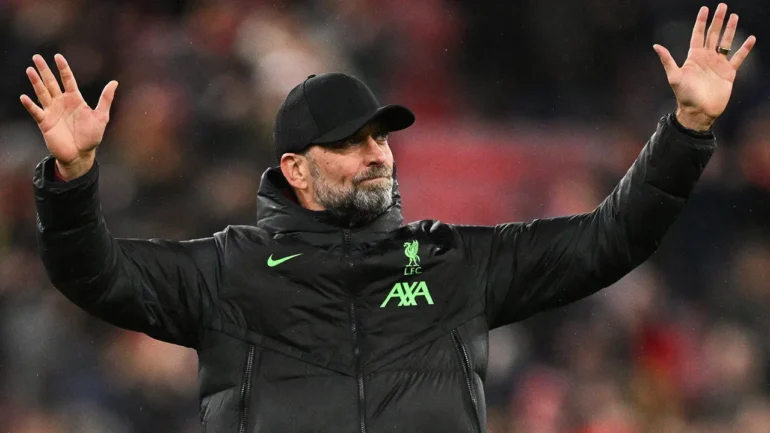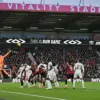Liverpool must heed the lessons of Manchester United.
It is not easy to work out how much credit to give football coaches. A study by The Economist in 2019 concluded that, after adjusting for the quality of the squad, the impact of big-name coaches was small. But among the few who had a clear, positive effect was Jürgen Klopp. So the charismatic German’s announcement last week that he would leave Liverpool at the end of the season has left fans dismayed. Over nine years he has revitalised the club, delivering a first league title since 1990 and a sixth European championship. And now he has run out of energy. His final match in charge at Anfield stadium will be a highly emotional affair. How does the club go about replacing the irreplaceable?
The first step is not to become overwrought. Modern football coaches are the public faces of their clubs, which makes it easy to overrate their importance. But Mr Klopp is a natural delegator. When appointed to coach Liverpool, he accepted that he would work with the chief executive, a sporting director (typically responsible for all footballing matters, from scouting youngsters to hiring coaches) and a head of player recruitment. They would have the final say on the club’s overall direction and on transfers.
The previous Liverpool coach, Brendan Rodgers, bristled at this perceived lack of control. Mr Klopp welcomed it. In 2017 he asked the club to sign a German forward, Julian Brandt. The sporting director, Michael Edwards, said his analysts preferred an Egyptian winger, Mohamed Salah. Mr Klopp accepted the decision. Mr Salah has gone on to become one of Liverpool’s greatest players.
Still, Mr Klopp’s longevity has made him increasingly integral to Liverpool. Mr Edwards left in 2022; his successor departed a year later. The current sporting director, Jörg Schmadtke, is a close friend of Mr Klopp and is also due to leave. Mr Klopp’s influence over transfers is believed to have grown in recent years. To give itself the best chance of continued success, the club needs to rebuild the structure—starting with the sporting director—that allowed Mr Klopp to thrive, rather than look for someone to fill the vacuum left by the exhausted incumbent.
Helpfully, Liverpool only need to look 30 miles down the motorway for a lesson in what not to do. In 2013 Sir Alex Ferguson announced his retirement as Manchester United’s manager after 27 years. He became so central to the club that his power was practically unchecked. For his final two years in the job, Sir Alex could walk past a nine-foot bronze statue of himself at the club’s Old Trafford ground. He was able to handpick his successor—a fellow Glaswegian, David Moyes—and then sit in the directors’ box to watch it all fall apart.
Sir Alex belonged to an era when football clubs were smaller. It was theoretically possible for one person to have the final say on everything from youth development to canteen menus. But by the time he retired United’s annual revenue was exceeding $500m. Sir Alex’s influence had stunted the growth of other senior figures. When he moved on, it became clear that United had fallen behind competitors in areas outside the first-team squad. The blame for recent failures has inevitably landed on his five successors. But this is unfair. Replacing Fergie was “somewhere in the range of impossible”, says Michael Caley, host of “Double Pivot”, a football podcast, “because you’re not really looking for one person, you really need three people”.
Liverpool must identify as precisely as possible what has made Mr Klopp’s teams perform so well in order to prolong its current period of success. If the key is Mr Klopp’s playing style, roughly summarised as winning the ball back high up the pitch and launching quick counter-attacks, then Liverpool might seek a coach who has enjoyed success playing in a similar way. A good bet could be Thomas Frank, at Brentford, a Premier League club in London. He, though, has less high-level experience than Mr Klopp had when he arrived at Anfield.
Alternatively, Liverpool might see Mr Klopp’s particular value as his connection with his players, the supporters and the rest of the club’s infrastructure. To imitate this, Liverpool might investigate Xabi Alonso, who is in charge of Bayer Leverkusen, the team topping the Bundesliga in Germany. Mr Alonso played for Liverpool with distinction in the 2000s and is hugely popular with the fans. Yet his Leverkusen team have a much slower, possession-heavy style, which would take time to reproduce at Liverpool with a squad designed for a different approach.
The last five months of Mr Klopp’s tenure will be an anxious time for Liverpool supporters. The club could still win the Premier League and three cups. But fans will be desperate for news of his replacement. In the short term, the best news would not be the trumpeting of another well-known coach, but the swift appointment of a new sporting director. That would be a sign that Liverpool intends to retain the structure in which Mr Klopp was able to bring his particular talents to bear.


